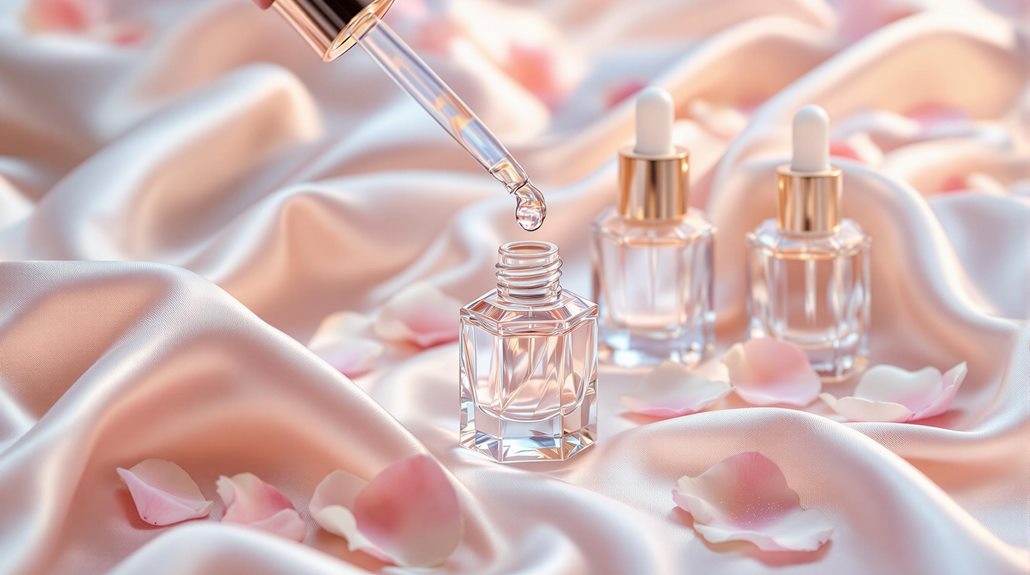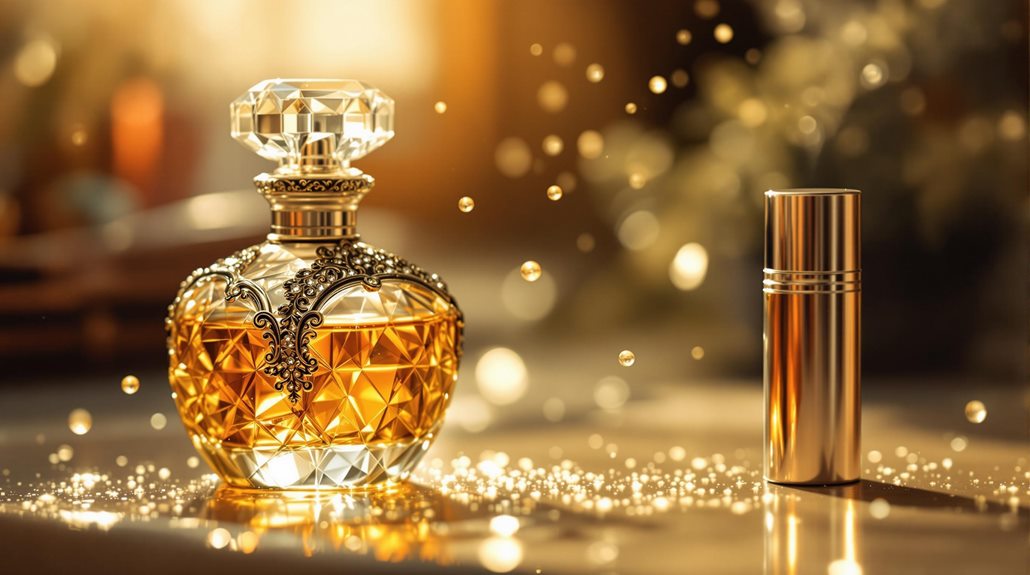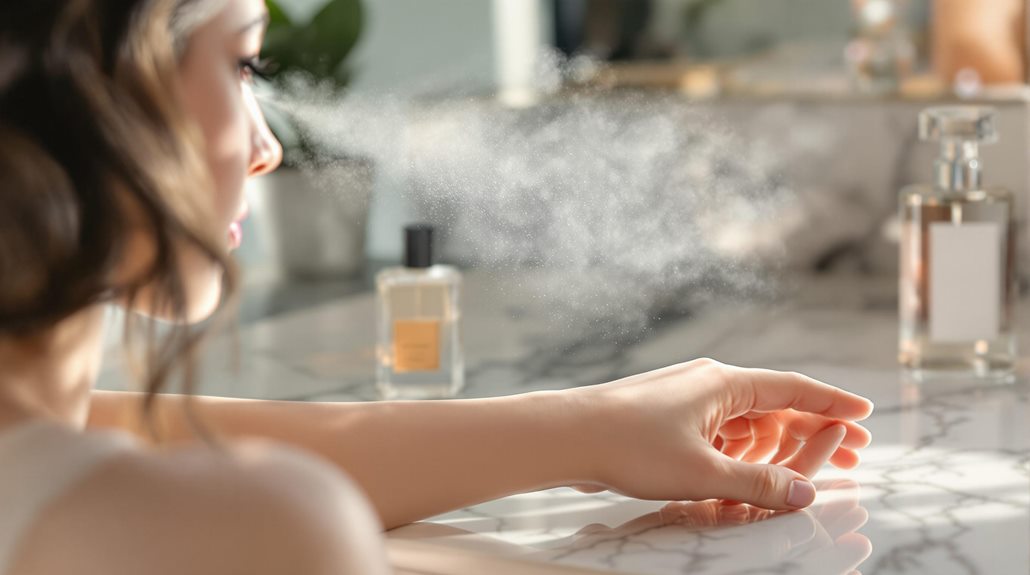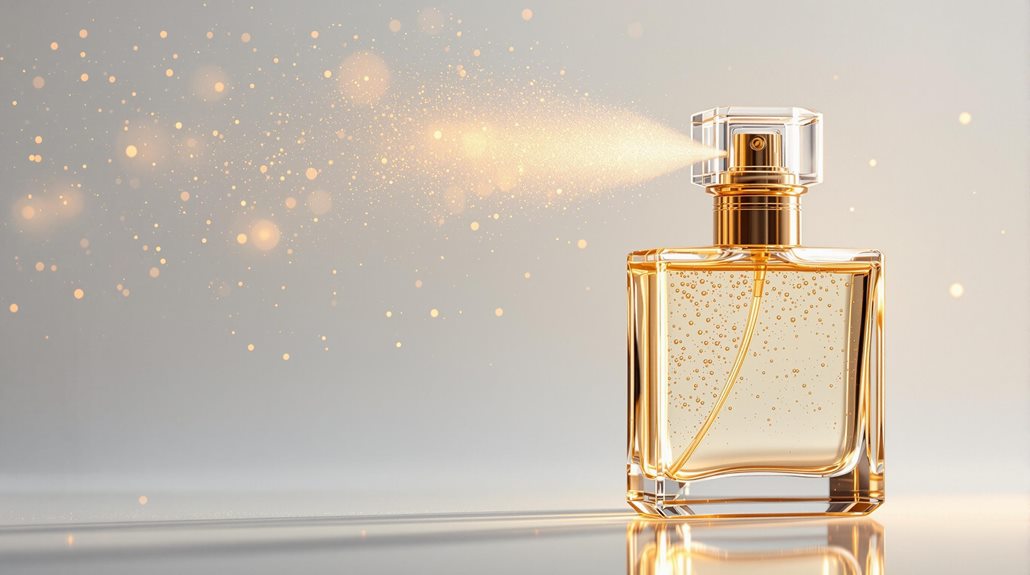Which Perfume Brands Test on Animals? Brands to Be Aware Of
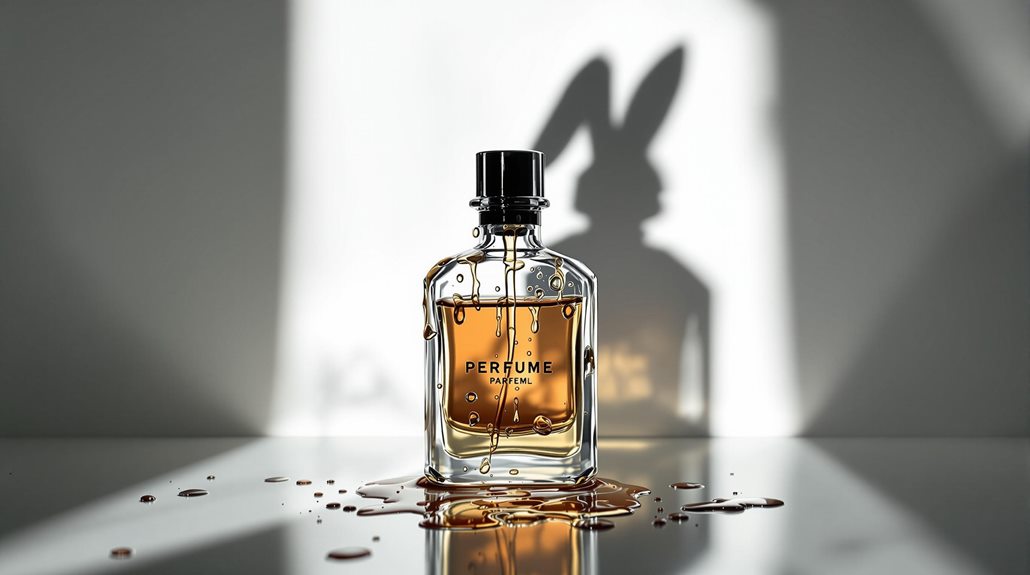
Many popular luxury perfume brands conduct animal testing, including Dior, Chanel, Gucci, and Prada. You'll also find major cosmetics conglomerates like L'Oreal, Estée Lauder, and Coty testing on animals, along with their subsidiary brands. Designer labels such as Marc Jacobs, Versace, and Armani participate in animal testing to sell in markets like China, where it's legally required. Even if a brand claims to be cruelty-free, their parent company may still test on animals through third-party laboratories. To make truly ethical fragrance choices, you'll want to understand the complex web of testing policies and market requirements.
Understanding Animal Testing in Perfumes
Traversing the world of cruelty-free perfumes can be deceptively complex. What appears to be a straightforward animal testing policy often involves multiple layers of scrutiny, especially when examining popular perfume brands that test their fragrances on animals.
You'll need to look beyond a brand's direct testing for cosmetics and consider several pivotal factors. First, if a perfume brand sells in China, where animal testing is mandatory by law, they can't claim to be truly cruelty-free, regardless of their practices elsewhere. Additionally, a brand's parent company's stance on animal testing can override the individual brand's policies, even if they don't conduct tests themselves.
To identify genuine cruelty-free brands, you'll have to investigate their entire supply chain. This includes examining their ingredient suppliers, third-party testing practices, and international market presence. While the growing conscious consumer movement has encouraged more brands to adopt cruelty-free practices, many mainstream perfume companies still conduct or commission animal testing. Some brands may claim to be "cruelty-free" while exploiting loopholes or using unclear terminology, making thorough research essential for ethical shopping.
Major Brands That Test
Despite the growing demand for cruelty-free products, many of the world's most recognized perfume brands continue to test on animals. If you're searching for cruelty-free perfume brands, you'll find that most luxury and designer fragrances aren't among them. Major fashion houses like Dior, Chanel, Gucci, and Prada all conduct or commission animal testing for their perfumes.
You'll also determine that fragrances from large cosmetics conglomerates aren't cruelty-free either. Brands owned by L'Oréal, Estée Lauder, and Coty are tested on animals, along with prestigious perfume houses like Acqua Di Parma, Tom Ford, and Jo Malone. Designer labels such as Marc Jacobs, Versace, and Armani typically test their fragrances on animals, especially when selling in markets that require it, like China.
Even mainstream brands you'll find in department stores aren't exempt from this practice. Popular names like Calvin Klein, Tommy Hilfiger, and Victoria's Secret continue to allow animal testing on their fragrances. This widespread testing among major brands can make it challenging for consumers who want to confirm their perfume choices align with cruelty-free values.
Common Testing Methods Used
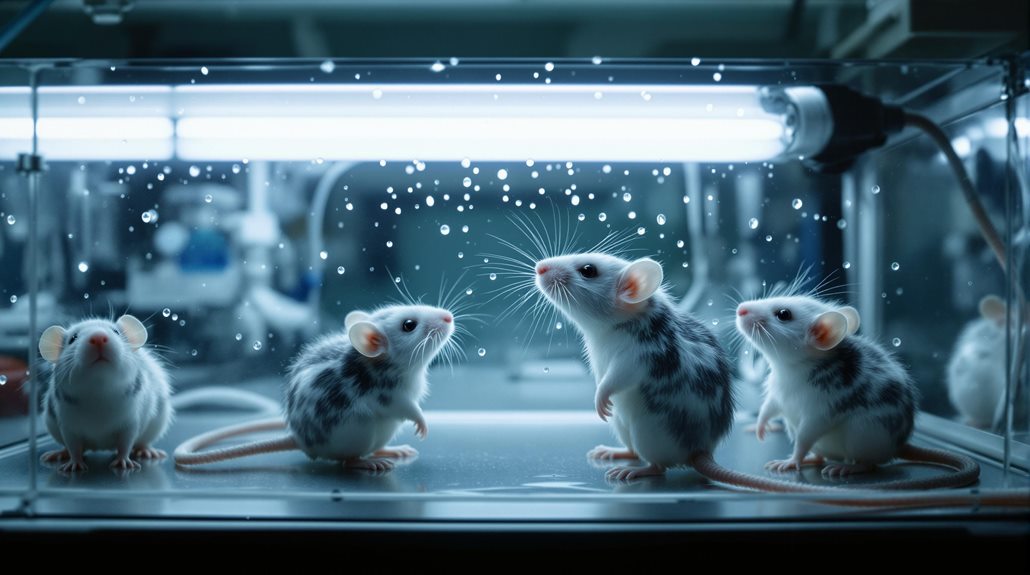
The testing methods these major brands employ are often harsh and invasive procedures that cause significant distress to animals. In pursuit of developing new fragrances, companies conduct extensive testing on rabbits, guinea pigs, and mice to evaluate product safety. These tests aren't cruelty free and typically involve applying fragrances directly to the animals' skin and eyes to check for irritation or harmful reactions.
You'll find that animal testing methods go beyond simple skin contact. Companies force-feed fragrance ingredients to animals to study toxicity levels and potential organ damage. They'll also expose them to substances through inhalation to monitor respiratory effects. What's particularly concerning is that many brands conduct long-term studies where animals endure repeated exposure to these substances over extended periods.
The testing doesn't stop there. Pregnant animals are subjected to experiments to determine if fragrance compounds might affect fetal development or reproductive health. These methods continue despite growing consumer demand for cruelty free alternatives and the availability of modern testing technologies that don't require animal subjects.
Countries Requiring Animal Testing
Global regulations surrounding animal testing present a complex patchwork of requirements, with China standing as the largest market still mandating these practices. If you're trying to support cruelty-free brands, it's important to understand that many companies must conduct animal testing to sell their products in China, even if they oppose these practices.
While China has recently relaxed some regulations for general cosmetics, allowing non-animal testing methods, special-use cosmetic products still require mandatory animal testing. This creates a significant challenge for brands wanting to maintain their cruelty-free status while expanding into the Chinese market. The situation is particularly problematic for European companies, as EU regulations ban animal testing, creating a direct conflict with Chinese necessities.
You'll also find varying requirements in other major markets. Brazil and India maintain certain animal testing requirements for cosmetic products, though they're generally more flexible than China's regulations. This global inconsistency in testing requirements means that a perfume brand might be cruelty-free in one market but required to conduct animal testing to sell in another, making it vital to research a brand's international selling practices.
Identifying Cruelty-Free Claims
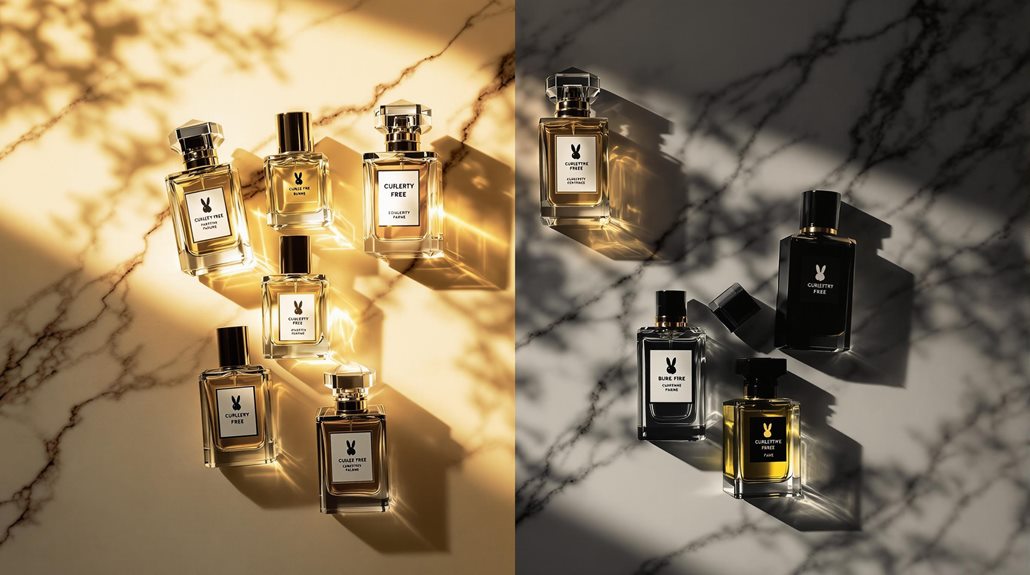
When shopping for cruelty-free perfumes, you'll need to look beyond simple "not tested on animals" labels, as these claims often don't tell the complete story. Some brands might market themselves as cruelty-free beauty while still selling their products in markets that require animal testing, making their statements misleading.
To guarantee you're buying genuine cruelty-free perfume, look for recognized certification seals like Leaping Bunny or PETA-approved logos. These organizations have strict standards and verify that brands don't test on animals at any stage of product development. However, don't stop at the logos alone – take time to research the brand's complete animal testing policy.
Check whether the brand is transparent about their supply chain practices and third-party testing policies. A truly cruelty-free company will openly share this information and maintain clear documentation of their commitment. Be particularly cautious of vague claims without supporting evidence or certification. If a brand's policy seems unclear or they're unwilling to provide detailed information about their testing practices, it's better to choose an alternative that offers complete transparency and verified cruelty-free certification.
Parent Company Testing Policies
Understanding a perfume brand's parent company policies adds another imperative layer to identifying truly cruelty-free products. While individual perfume brands might claim they don't test on animals, their parent companies often have different practices that override these claims.
Major beauty conglomerates like Estee Lauder, L'Oreal, and Coty own numerous popular perfume brands, and their animal testing policies typically extend to all their subsidiaries. This means even if your favorite perfume brand states it's cruelty-free, its parent company might still conduct or commission animal testing for other products or markets.
You'll need to look beyond surface-level claims to determine a perfume's true cruelty-free status. Many brands owned by these large corporations may appear to be cruelty-free but continue selling in markets where animal testing is required by law. This creates a loophole that makes them ineligible for legitimate cruelty-free certification. When researching your perfume choices, don't stop at the brand level - investigate the parent company's stance on animal testing to verify you're making an informed decision that aligns with your values.
Hidden Animal Testing Practices
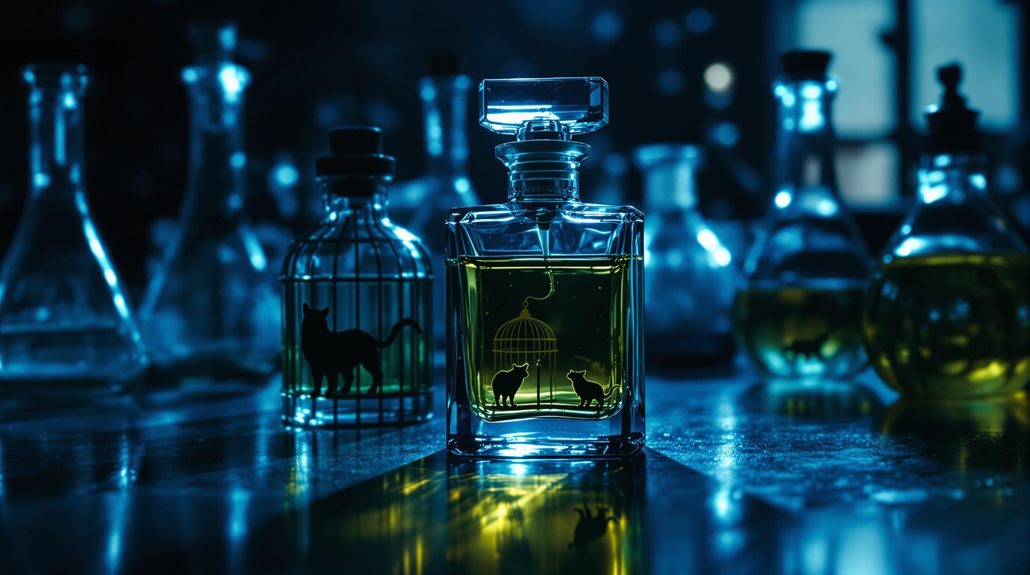
Despite claims of ethical practices, many perfume brands engage in hidden animal testing through various indirect methods and regulatory loopholes. When you're trying to find cruelty-free perfume, you'll need to look beyond surface-level marketing claims and investigate deeper into a brand's testing policies.
Many Eau de Parfum manufacturers use vague language to mask their involvement in animal testing. They might state "we don't test on animals" while quietly conducting tests through third-party laboratories or allowing testing in markets where it's legally required. Beauty Without Bunnies and other certification programs help identify truly cruelty-free fragrance brands, but even these require careful verification.
You'll want to watch for red flags like brands selling in China, where animal testing is mandatory for imported cosmetics, or brands owned by parent companies that conduct animal testing. Some companies cleverly word their policies to suggest cruelty-free practices while still participating in animal testing through ingredient suppliers or regulatory requirements. To confirm you're supporting genuine cruelty-free practices, research both the brand's direct testing policies and their broader business operations, including market presence and corporate ownership.
Alternative Testing Technologies Available
Three major scientific breakthroughs have revolutionized cosmetic safety testing without harming animals. These include advanced in vitro testing methods, sophisticated computer modeling systems, and innovative human cell culture techniques. Today, there are over 50 validated alternative testing methods that brands can use to guarantee their products' safety.
You'll find that many companies are now investing heavily in these cruelty-free technologies, particularly in developing 3D human skin models and organ-on-a-chip systems. These alternatives actually provide more accurate, human-relevant safety data than traditional animal tests. Even at a higher initial price point, brands are exploring that these methods are more efficient and reliable for testing everything from essential oils to complex fragrance compounds.
The regulatory environment is changing too. With the European Union and China updating their requirements to accept non-animal testing data, you're seeing more vegan product certifications across the perfume industry. These changes aren't just good news for animals - they're advancing the science of safety testing. Brands can now validate their products using more sophisticated, humane methods that better predict how cosmetics will interact with human biology.
Consumer Impact on Industry Change
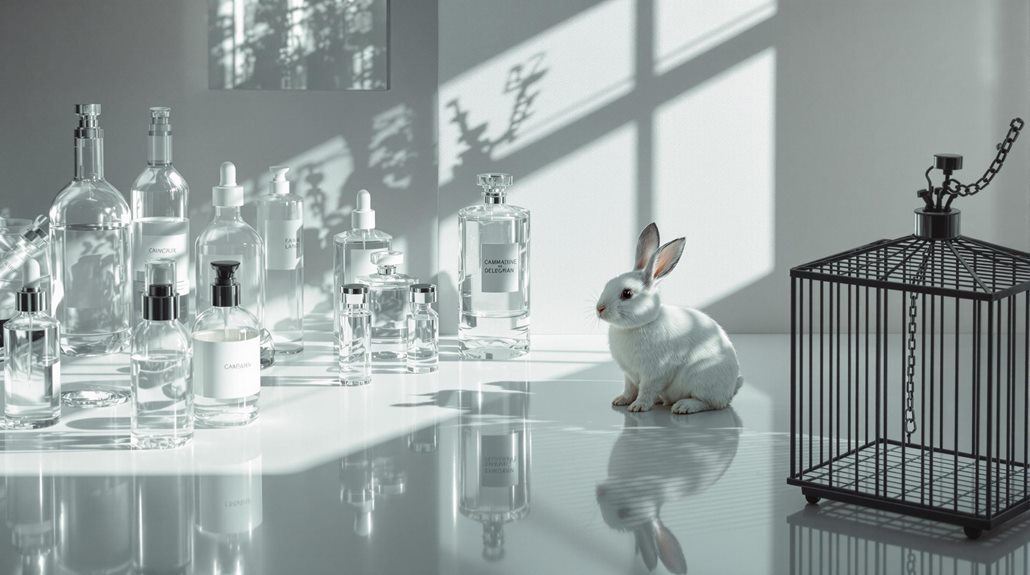
While scientific advancements have expanded testing alternatives, consumer behavior has become the real catalyst for industry-wide change. A lot of people are now paying closer attention to the beauty brands they support, choosing to boycott companies that continue animal testing while actively seeking out cruelty-free alternatives.
It's great to see how social media campaigns and consumer advocacy have successfully pressured major perfume brands to reconsider their testing practices. Your purchasing decisions have more power than you might think - as consumers continue to keep an eye on brand ethics, companies are responding by investing in non-animal testing methods and becoming more transparent about their practices.
The rise of ethical consumption has created a significant shift in the fragrance industry. When you choose to switch to cruelty-free alternatives, you're contributing to a larger movement that's reshaping industry standards. Beauty brands are learning that maintaining animal testing policies can damage their reputation and bottom line, leading many mainstream companies to move toward more ethical practices to meet consumer demands and stay competitive in today's market.
Ethical Perfume Shopping Guide
Shopping for truly cruelty-free perfumes requires careful research and attention to brand policies. When browsing fragrances in general, you'll need to look beyond marketing claims and investigate each company's testing practices. Many popular designer brands aren't cruelty-free due to their licensing agreements with larger corporations that conduct animal testing.
To make your ethical perfume shopping guide more effective, start by consulting trusted resources like Cruelty-Free Kitty's product lists. They extensively investigate brands and categorize them as either cruelty-free, not cruelty-free, or in the grey area. Be wary of luxury perfume houses like Acqua Di Parma, Atelier Cologne, and Jo Malone, as they often participate in markets requiring animal testing.
Don't assume that niche perfume brands are automatically cruelty-free. Some may use loopholes or provide unclear information about their testing policies. Instead, stick to verified cruelty-free brands that have been thoroughly vetted. When in doubt, check detailed databases and look for brands that explicitly state their commitment to avoiding animal testing and refuse to sell in markets where it's required.
Conclusion
You can make a difference in ending animal testing by choosing cruelty-free perfume brands and speaking with your wallet. Stay informed about brands' testing policies, check for legitimate certifications, and don't be fooled by vague claims. Support companies using alternative testing methods, and let others know why you've made the switch. Together, we'll create more demand for ethical, animal-friendly fragrances.

